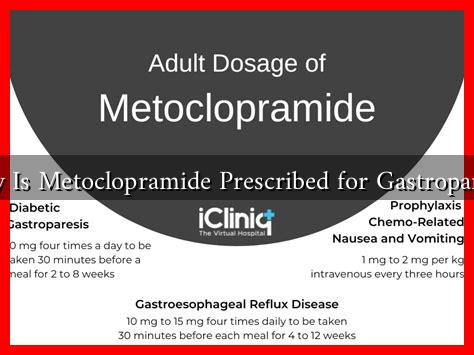-
Table of Contents
Why Is Metoclopramide Prescribed for Gastroparesis?
Gastroparesis is a chronic condition characterized by delayed gastric emptying, which can lead to a variety of symptoms including nausea, vomiting, bloating, and abdominal pain. This condition can significantly impact a patient’s quality of life, making it essential to find effective treatments. One medication that is frequently prescribed for gastroparesis is metoclopramide. This article explores the reasons behind its prescription, how it works, and its potential benefits and risks.
Understanding Gastroparesis
Gastroparesis can be caused by various factors, including diabetes, neurological disorders, and certain medications. The condition affects the stomach’s ability to move food into the small intestine, leading to a range of uncomfortable symptoms. According to the International Foundation for Gastrointestinal Disorders, gastroparesis affects approximately 4% of the population, with women being more likely to develop the condition than men.
What Is Metoclopramide?
Metoclopramide is a medication that acts as a dopamine receptor antagonist and a prokinetic agent. It is primarily used to treat nausea and vomiting, but it also enhances gastric motility, making it particularly useful for patients with gastroparesis. The drug works by:
- Increasing the contractions of the stomach muscles.
- Facilitating the movement of food through the digestive tract.
- Blocking dopamine receptors in the brain, which helps reduce nausea and vomiting.
Why Is Metoclopramide Prescribed for Gastroparesis?
There are several reasons why metoclopramide is commonly prescribed for patients with gastroparesis:
- Improved Gastric Emptying: Metoclopramide enhances gastric motility, which can help alleviate symptoms associated with delayed gastric emptying.
- Reduction of Nausea and Vomiting: By blocking dopamine receptors, metoclopramide effectively reduces nausea and vomiting, which are common symptoms of gastroparesis.
- Convenient Administration: Metoclopramide can be administered orally or intravenously, providing flexibility in treatment options.
- Cost-Effectiveness: Compared to other treatments for gastroparesis, metoclopramide is relatively inexpensive and widely available.
Case Studies and Statistics
Numerous studies have demonstrated the efficacy of metoclopramide in treating gastroparesis. For instance, a study published in the journal Gastroenterology found that patients treated with metoclopramide experienced a significant reduction in symptoms compared to those receiving a placebo. In this study, 60% of patients reported improved gastric emptying and a decrease in nausea levels.
Another case study highlighted a 35-year-old woman with diabetic gastroparesis who experienced severe nausea and vomiting. After starting metoclopramide, her symptoms improved significantly, allowing her to resume normal activities and dietary habits.
Potential Risks and Side Effects
While metoclopramide can be effective, it is not without risks. Some potential side effects include:
- Drowsiness or fatigue
- Diarrhea
- Extrapyramidal symptoms (movement disorders)
- Long-term use can lead to tardive dyskinesia, a serious movement disorder
Due to these risks, metoclopramide is typically prescribed for short-term use, and patients are closely monitored for any adverse effects. It is crucial for patients to discuss their medical history and any other medications they are taking with their healthcare provider to minimize risks.
Conclusion
Metoclopramide is a valuable medication for managing gastroparesis, offering benefits such as improved gastric emptying and reduced nausea. While it is generally effective, patients must be aware of the potential side effects and engage in open communication with their healthcare providers. As research continues to evolve, it is essential for patients to stay informed about their treatment options and work collaboratively with their healthcare team to find the best approach for managing their condition.
For more information on gastroparesis and its treatment options, you can visit the International Foundation for Gastrointestinal Disorders.


